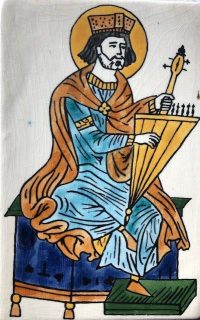David and All His Trouble
A reflection on life, change, community, wisdom and the value of psalmody from Vincent Strudwick
Visiting an old friend in a care home – a monk from the community to which I had once belonged – I was surprised to find him in the lounge with a crowd of residents singing.
‘Pack up your troubles in your old kit bag, and smile, smile, smile.’
Many of the group were in various stages of dementia, yet all were singing and smiling, as the old once familiar words ‘came back to them’.
This insight of familiar words coming back to one, especially when sung, should not have surprised me, because of course the staple diet of all religious communities is the Divine Office in some form or other, and its main ingredient is the book of psalms. These Hebrew poems by authors ranging over centuries, began in moments of crises, celebration or ritual, and were repeatedly said or sung as a source of reflection, inspiration and hope.
‘As the words came back to them…’
The 16th century theologian Richard Hooker, respected across many Christian faith traditions, writing as the Church of England sought to establish an identity after the watershed moment we call ’the Reformation’, said:
‘David, having singular knowledge, not in poetry alone, but in music also, judged them to be things necessary…for the sweeting of our affections towards God’
We know now of course that David didn’t write all the psalms. Critical historical theology was to come much later; but I couldn’t resist choosing this title because it is the first verse of psalm 132, and focuses the core Hebrew inspiration of all the psalms, which reflect with piercing honesty the ‘trouble’ of being a human being.
That ‘trouble’, which is true for every generation is that growth, change and the ups and downs of life produce anxiety, disturbance, puzzlement and grief, as well as joy. Coming together as a group and singing, both establishes the groups identity in ‘belonging’ and in moments of crisis and trial, offers the opportunity for the sweeting of our affections.
For many in Contemplative Fire, this was echoed in Philip’s rhythmic drumming and verse when we gathered, and lingers in our dispersed mode, as I guess the old kit bag song will mean something to many pilgrims because you will know the context. However I have found it means nothing to my teenage grandchildren whose rucksacks don’t have the history; and if you try to explain, the comment is likely to be ‘Deep, Grandad’. In current teen-speak this means serious to the point of being heavy and boring. But I’m not giving up.
The change in the meaning of words, and knowing something of their original context, is also true of the psalms. When I was in community in 1950, I remember going a whole term reciting in Psalm 119
‘I am become like a bottle in the smoke’
‘Am I ?’ I asked myself.
Scholars and preachers have come up with a variety of interpretations of this psalm, as well as its date of origin and authorship; but I still prefer what I then discovered, that it may have described the whirlwind of a desert storm that leaves the traveller disoriented and without a sense of direction. In this psalm, as in many, a conversation with God ensues.
There is a Jewish story of a congregant who complained to a friend that God hadn’t responded prayers voiced by his Rabbi in the synagogue. There was never a miracle.
‘You think it a miracle when God does what your Rabbi asks, was the reply. We think it a miracle when our Rabbi responds to what God has promised.’
The psalms are examples of prayer as a repeated conversation between self, self in community, and God as we struggle to understand what is happening in our lives. We can share what we really feel (the so called ‘cursing’ psalms, the laments, the failings) but underneath all of this is prayer in the form of dialogue.
‘Tell me O Lord, what is my end,
and what is the measure of my days ?
Let me know how mortal I am !
Teach us to count our days,
that we may gain a heart of wisdom.’
For Christians it was St Benedict at a time of global disorientation during the fall of the Roman Empire in the 6th century, who gathered pilgrims into communities as hords of rootless migrants sought to recover a sense of place and identity.
I was once asked to conduct a retreat for a Benedictine community and asked Dame Felicitas Corrigan, a distinguished Roman Catholic nun of (then) Stanbrook Abbey what she considered lay at the source of Benedict’s vision.
She replied (quoting Ephesians 3 verses 17 – 19) that it was being ‘rooted and grounded in love’;’ to know the love of Christ that surpasses knowledge so you may be filled with all the fullness of God’ for that is where search for identity and belonging lies.
I believe we are in a watershed moment today, and in addition to the quest that accompanies every generation, we are experiencing a global disorientation, that calls communities of prayer and service to a special observance.
So this is my suggestion, expressed in a verse to George Herbert by the contemporary poet Malcolm Guite:
‘…tune your lute,
And listen for an echo from above.
Open the window, let me hear you sing.
And see the Word with you in everything.’

Vincent is an old friend and colleague of Philip, and he and Nina his wife have been companions in discernment through the transformations since Contemplative Fire’s beginnings.
